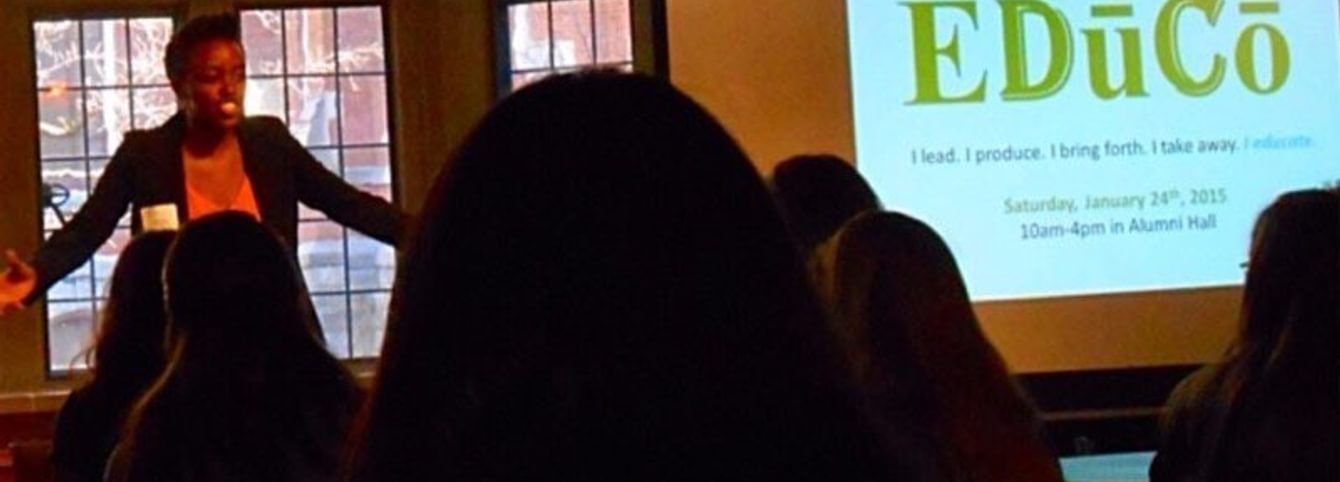Omega Tennant (CLS 2014 Chinese), started the Chinese Studies Program in Nashville, TN at MLK Magnet School in 2013, with the goal of extending language learning services and promoting in-depth understanding of the culture behind Mandarin Chinese to students from marginalized backgrounds. Omega used an Alumni Development Fund (ADF) to purchase more materials for the initiative, which she expanded in 2014.
Firstly, ADF allowed her to provide supplies and transportation to and from MLK Magnet School for Chinese tutors, increasing the number of tutors from one to four. This provided the students with a better opportunity to learn Chinese, in addition to giving the tutors the ability to gain hands-on experience working with students learning Chinese as a foreign language. The new group of tutors includes native undergraduate and graduate speakers as well as one advanced speaker of Chinese as a second language. The ADF also gave Omega the opportunity to co-host a luncheon for China’s Lantern Festival for middle and high school students studying Chinese as MLK, as well as the ability to continue working with the 8th grade beginning Chinese class by providing prepared PowerPoints and activities to supplement the material being taught in class.
The second component of her ADF project took place at Vanderbilt University among her peers. Omega wanted to provide more opportunities for Vanderbilt students increase their Chinese proficiency and understanding of Chinese history and culture. At Vanderbilt, Omega lives in McTyeire International Hall: a living-learning community that encourages students to practices their language of study four times a week for an hour during dinner and once a week during a study break with their language hall. In order to enhance the quality of language use on the hall Omega worked with the Chinese hall coordinator and faculty advisor to stimulate residents’ dinner discussions. In addition to dinner discussions, Omega wanted to expose more students to the options they have to study abroad. With the ADF, she hosted two events for undergraduate and graduate students at Vanderbilt University to promote study abroad and Chinese culture. In September 2014, she led a hall study break where she shared videos and photos of her time in Guangzhou while answering questions about the application process for the Critical Language Scholarship as well as other study abroad language programs. On December 6th, 2014, Omega also hosted a 火锅 (hot pot) Gathering McTyeire, where about seventeen residents gathered around electric pots, adding ingredients and speaking Chinese.
The final project that Omega worked on using the Alumni Development Fund extended beyond the Chinese Studies Program. Omega worked with Vanderbilt’s Global Education Office to organize the 4th annual interdisciplinary conference on global research and study abroad (ICGRSA). The theme of the conference was “Educo: I Lead. I Produce. I bring forth. I take away. I Educate.” The conference took place on January 24th. There were 53 participants for four different schools (as compared to 26 participants in 2014 with all but one from Vanderbilt).
Omega Tennant plans to continue to work as a peer advisor at the Global Education Office to develop a study abroad alumni organization at Vanderbilt and speak with prospective students about studying abroad.
The Alumni Development Fund in 2014 awarded funding to 65 alumni from the 2014 cohort who submitted proposals for activities to assist with their continued language learning and/or professional academic development. Priority was given to applications that incorporated or explained how their activity would have a wider impact on others (e.g. students, CLS alumni, community).
2014 ADF projects covered a wide scope of topics and activities. Some projects focused on improving the awardee’s CLS language skills in order to indirectly affect the public through the creation of language materials, improving one’s effectiveness at their workplace, and sharing their research and CLS experience at national conferences. Other projects directly impacted others, for example through the creation of an international pen-pal exchange, language tables at universities, and community events highlighting their host languages and cultures.


